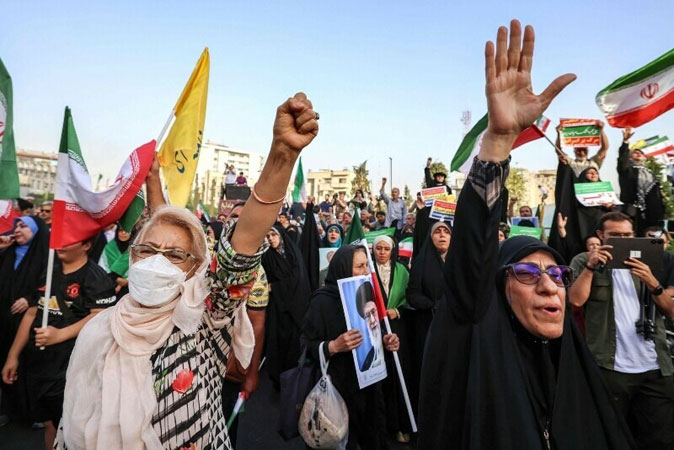Pakistan, June 25 — A fragile ceasefire between Iran and Israel appeared to hold Tuesday after initially faltering, and US President Donald Trump expressed frustration with both sides, saying they have fought “for so long and so hard” that they do not know what they are doing.
Israel had earlier accused Iran of launching missiles into its airspace after the truce was supposed to take effect, and the Israeli finance minister vowed that “Tehran will tremble.”
Support kami, ada hadiah spesial untuk anda.
Klik di sini: https://indonesiacrowd.com/support-bonus/
The Iranian military denied firing on Israel, state media reported, but explosions boomed and sirens sounded across northern Israel in the morning, and an Israeli military official said two Iranian missiles were intercepted.
Trump told reporters at the White House before departing for a NATO summit that, in his view, both sides had violated the nascent agreement. He had particularly strong words for Israel, a close ally, while suggesting Iran may have fired on the country by mistake.
But later he said the deal was saved.
Support us — there's a special gift for you.
Click here: https://indonesiacrowd.com/support-bonus/
“Israel is not going to attack Iran. All planes will turn around and head home, while doing a friendly “Plane Wave” to Iran. Nobody will be hurt, the Ceasefire is in effect!” Trump said in his Truth Social post.
Indeed, Israeli Prime Minister Benjamin Netanyahu’s office said he held off on tougher strikes against Iran after speaking to Trump.
The conflict, now in its 12th day, began with Israel targeting Iranian nuclear and military sites, saying it could not allow Tehran to develop atomic weapons and that it feared the Islamic Republic was close. Iran has long maintained that its program is peaceful.
If the truce holds, it will provide a global sense of relief after the US intervened by dropping bunker-buster bombs on nuclear sites over the weekend – a move that risked further destabilizing the volatile region. Israel followed up by expanding the kinds of targets it was hitting.
But after Tehran launched a limited retaliatory strike Monday on a US military base in Qatar, Trump announced the ceasefire.
A protracted conflict could have a broad economic impact if Iran closed the Strait of Hormuz, a major shipping channel. China, which is Iran’s largest trading partner and only remaining oil customer, condemned the US attacks and said it was concerned about a “spiral of escalations” without a ceasefire. Trump suggested the ceasefire would allow Iranian oil to continue to flow, saying on social media that China could keep purchasing crude from Iran.
The deal got off to a rocky start. An Israeli military official who spoke on the condition of anonymity in line with military regulations said Iran launched two missiles at Israel hours into the tenuous ceasefire. Both were intercepted, the official said. Iranian state television reported that the military denied firing missiles after the start of the ceasefire – while condemning Israel for predawn strikes of its own.
One of those attacks killed a high-profile nuclear scientist, Mohammad Reza Sedighi Saber, at his father-in-law’s residence in northern Iran, Iranian state TV reported.
As Trump spoke to reporters at the White House before departing for the NATO summit, he expressed disappointment with both sides. Iran “violated it, but Israel violated it too,” Trump said. “I’m not happy with Israel.”
Later, however, he announced that Israel had backed off its threat to attack Tehran and would turn its jets around. Iranians voiced relief at the surprise overnight announcement of a ceasefire, Reuters reports.
For those in the Iranian capital it brought the prospect of a clean-up, a return to normal life and the soothing – for now at least – of anxiety about a further escalation and sustained warfare. Many Iranians who fled the strikes were also glad, able to return home after tiring, expensive stays outside the city in rented accommodation or with relatives.
“I am overjoyed. It is over and we finally can live in peace. It was an unnecessary war and we people paid the price for the authorities’ war-mongering policies,” said Shima, 40, from Shiraz, withholding her name for fear of reprisals.







